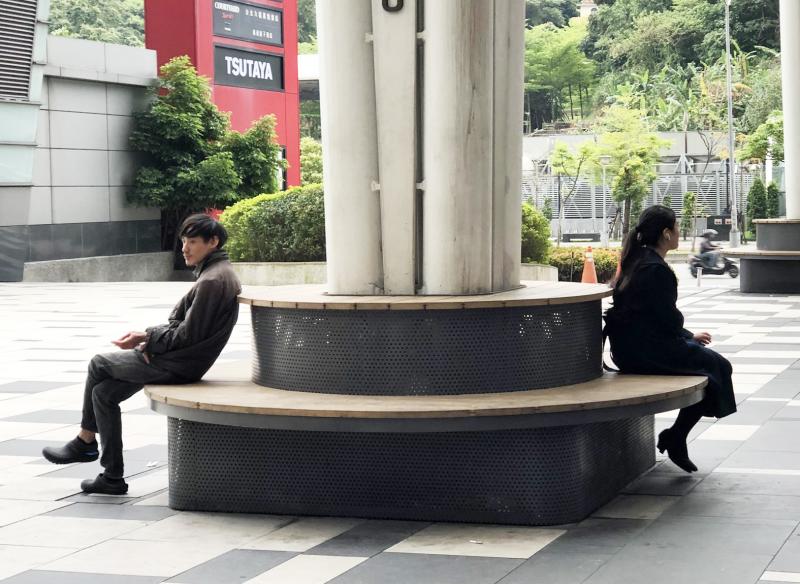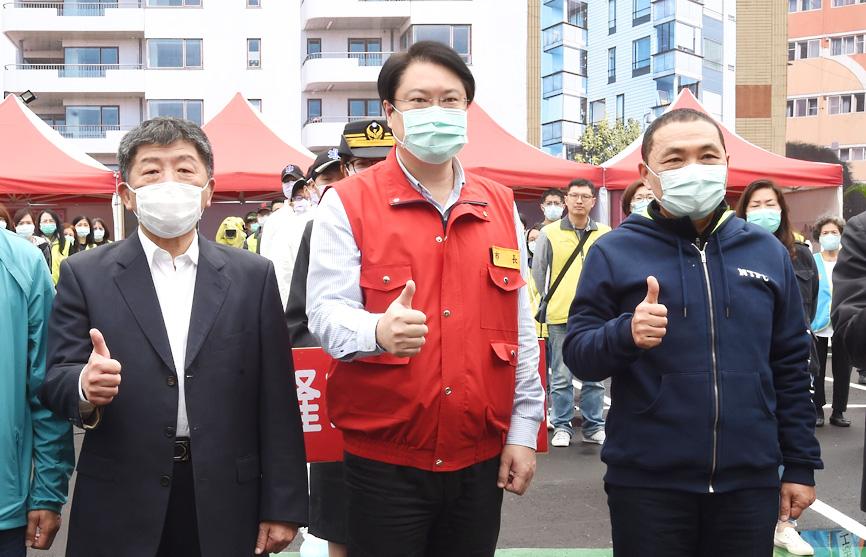The Central Epidemic Command Center (CECC) yesterday announced 16 new cases of COVID-19, including two domestic cases, as it urged people to practice social distancing in public spaces by keeping a distance of at least 1m when outdoors and 1.5m indoors.
Minister of Health and Welfare Chen Shih-chung (陳時中), who heads the center, said that seven of the new cases tested positive upon their arrival at the airport, four were under home quarantine, one was under home isolation and two were under self-health management, while the two domestic cases sought treatment on their own.
The domestic cases are a man in his 70s and a man in his 20s who had not traveled abroad recently.

Photo: CNA
The older man, the nation’s 307th case, had a meal with case No. 122, who returned from Turkey on March 13 and tested positive on March 20, he said.
Forty-six people have been identified as having had contact with the 307th case, Chen said.
The man on Wednesday last week sought treatment for chest tightness and muscle pain, and again on Thursday and Saturday for a fever and pneumonia, he said.

Photo: Liu Hsin-de, Taipei Times
The younger man, the nation’s 322nd case, on Thursday last week sought treatment at a clinic for a fever, coughing, vomiting and fatigue, and was hospitalized for pneumonia when he sought treatment again at a hospital on Sunday.
He was mainly at his school campus or dormitory before the onset of symptoms, and a contact investigation has so far found 13 people who had had contact with him, Chen said.
The possible source of infection is being investigated, he added.
The 14 imported cases are seven men and seven women, who returned to Taiwan between March 16 and Sunday, Chen said, adding that seven of them had recently traveled to the UK, three had been to the US, and the remainder had been to Iceland, France, Switzerland, Thailand and the Philippines.
Three of them have been associated with other previously confirmed cases and are considered cluster infections, he said.
As of yesterday, Taiwan had 322 confirmed cases — 276 imported and 46 local — including five deaths and 39 recovered patients, CECC data showed.
“The basic principle for social distancing in public spaces, where people might encounter strangers, is keeping a distance of at least 1m from other people in outdoor settings and at least 1.5m in indoor settings,” Chen said.
“In areas where this minimum distance cannot be kept, people should wear a mask,” the minister added.
Detailed guidelines on social distancing would be discussed at a CECC meeting and published today, he said.
As local Chinese-language media have reported that a student at National Taiwan Normal University in Taipei was confirmed to have been infected with COVID-19, reporters asked whether case No. 322 was that student and whether the classes he attends would be suspended.
Centers for Disease Control Deputy Director-General Chuang Jen-hsiang (莊人祥) said that as the student tested positive on Monday night, a contact investigation was still being conducted.
Other students sharing the patient’s laboratory and dormitory room would be put under home isolation, while the classes he attends would be suspended for 14 days, Chuang said.
CECC advisory specialist panel convener Chang Shan-chwen (張上淳) said the panel has expanded the criteria for reporting suspected COVID-19 cases to include “all patients with pneumonia” and people who have lost their sense of smell or taste, as 24 of the 306 confirmed cases had reported such symptoms as of Monday.
Asked whether the nation has enough ventilators to meet demand in the event of a local outbreak, Shih said the nation’s 201 designated emergency hospitals have about 10,000 ventilators, or 14,000 if the devices in other healthcare facilities are included.
Taiwan has 61 ventilators per 100,000 people, which is higher than Germany’s 24, the UK’s 12 and Italy’s 5, he said.

CHAOS: Iranians took to the streets playing celebratory music after reports of Khamenei’s death on Saturday, while mourners also gathered in Tehran yesterday Iranian Supreme Leader Ayatollah Ali Khamenei was killed in a major attack on Iran launched by Israel and the US, throwing the future of the Islamic republic into doubt and raising the risk of regional instability. Iranian state television and the state-run IRNA news agency announced the 86-year-old’s death early yesterday. US President Donald Trump said it gave Iranians their “greatest chance” to “take back” their country. The announcements came after a joint US and Israeli aerial bombardment that targeted Iranian military and governmental sites. Trump said the “heavy and pinpoint bombing” would continue through the week or as long

TRUST: The KMT said it respected the US’ timing and considerations, and hoped it would continue to honor its commitments to helping Taiwan bolster its defenses and deterrence US President Donald Trump is delaying a multibillion-dollar arms sale to Taiwan to ensure his visit to Beijing is successful, a New York Times report said. The weapons sales package has stalled in the US Department of State, the report said, citing US officials it did not identify. The White House has told agencies not to push forward ahead of Trump’s meeting with Chinese President Xi Jinping (習近平), it said. The two last month held a phone call to discuss trade and geopolitical flashpoints ahead of the summit. Xi raised the Taiwan issue and urged the US to handle arms sales to

BIG SPENDERS: Foreign investors bought the most Taiwan equities since 2005, signaling confidence that an AI boom would continue to benefit chipmakers Taiwan Semiconductor Manufacturing Co’s (TSMC, 台積電) market capitalization swelled to US$2 trillion for the first time following a 4.25 percent rally in its American depositary receipts (ADR) overnight, putting the world’s biggest contract chipmaker sixth on the list of the world’s biggest companies by market capitalization, just behind Amazon.com Inc. The site CompaniesMarketcap.com ranked TSMC ahead of Saudi Aramco and Meta Platforms Inc. The Taiwanese company’s ADRs on Tuesday surged to US$385.75 on the New York Stock Exchange, as strong demand for artificial intelligence (AI) applications led to chip supply constraints and boost revenue growth to record-breaking levels. Each TSMC ADR represents

State-run CPC Corp, Taiwan (CPC, 台灣中油) yesterday said that it had confirmed on Saturday night with its liquefied natural gas (LNG) and crude oil suppliers that shipments are proceeding as scheduled and that domestic supplies remain unaffected. The CPC yesterday announced the gasoline and diesel prices will rise by NT$0.2 and NT$0.4 per liter, respectively, starting Monday, citing Middle East tensions and blizzards in the eastern United States. CPC also iterated it has been reducing the proportion of crude oil imports from the Middle East and diversifying its supply sources in the past few years in response to geopolitical risks, expanding